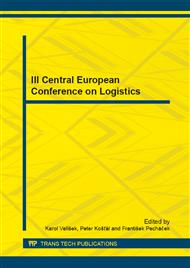p.280
p.286
p.294
p.302
p.309
p.316
p.324
p.335
p.342
The Time Analysis of Material Flow with Methods Time Measurement Contribution to CSR Implementation at the Level of Industrial Production II
Abstract:
The importance of forming and implementation the socially responsible society is highlighted by report on the creation of conditions for CSR in Slovakia. Recommendations arising from the report defines the starting points, from which for the article is chosen motivate companies to attend the United Nations Global Compact and other networks that support CSR, as well as the need for the integration of CSR and sustainable development issues in educational process [1, 2, 3, . Companies that support the initiative, as well as direct implementation of the CSR must take action leading to its successful implementation in all areas of business processes, including the logistics and material flow. In the analysis of material flows should be respected the limiting factor of physical load in handling and transport activities that affect the setting of time norm that is required for realization of work activity. The time analysis of material flow allows the identification of time consumption for individual work actions, which are needed during realization of work operation. For time analysis of material flow realization we can use the Method Time Measurement. More specifically, we can use the Method Time Measurement Logistic, which is the subject of this article. Selection of the method is a logical step, which resulted from the needed of responsibility in area of exact decision-making and objective assessment of the efficiency of material flows for minimizing the impact of risk factors. The article provides the information about characteristic of mentioned method, it describe the possible areas of using the method and presents the illustrative example of practical application of method for time analysis of material flow, whereby the main emphasis is on the social aspect of corporate social responsibility through ergonomics and the effectiveness using of time during the work operations realization within the framework of material flow
Info:
Periodical:
Pages:
309-315
DOI:
Citation:
Online since:
February 2013
Authors:
Keywords:
Price:
Сopyright:
© 2013 Trans Tech Publications Ltd. All Rights Reserved
Share:
Citation:


